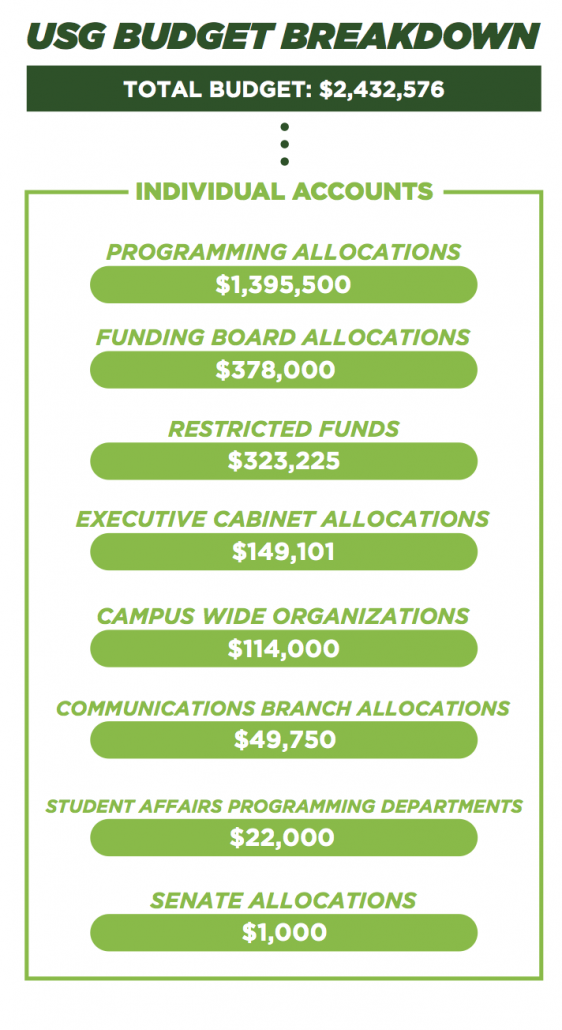Evaluating USG’s multi-million dollar budget

Operating on a $2.4 million budget, the Undergraduate Student Government is responsible for funding various student organizations and resources, including free legal counseling and HIV testing for students. Created from a $64 line item in each undergraduate student’s tuition, the budget’s allocation is decided by the USG treasurer, a member of the Budget Allocations Committee.
More than half of the USG budget is designated toward Programming Allocations, where budget members are made up of student committees and cultural assemblies. Programming Allocation is determined through a cooperative process between budget members and the Budget Allocations Committee.
The Budget Allocations Committee decides how much funding a student organization, or budget member, will receive based on the group’s funding proposal and its previous spending history, according to USG Treasurer Rohan Parepally.
“One to two times a year, we revisit the budget to see how people are spending their money,” Parepally said. “[We see] whether the money is being effectively spent and then if we could re-allocate it to areas that could use it.”
USG’s Concerts Committee received a budget of $589,000, about 42% of all programming allocations.
Budget members meet with Parepally each month to evaluate previous spending habits and raise any concerns or requests for additional financial assistance. Having one month between meetings allows the members enough freedom to work out any issues internally without the government overreaching, Parepally said.
Nearly one-fifth of the budget is directed toward departments under the funding branch, which includes the discretionary and the philanthropy funds. According to Parepally, the funding branch serves as a pool of extra funding for student programs that need additional financial support.
The philanthropy fund distributes money for philanthropic and community outreach events hosted by student organizations which have exceeded their budget, Parepally said. The discretionary fund supports student groups organizing cultural and entertainment events, acting as a safety net if the organizations spend beyond their allocated budget.
About $150,000 of the budget is directed toward executive cabinet allocations, broken up by three main funding accounts: administration, development and executive/legislative. Administrative expenses include costs for the USG office such as maintenance and office supplies, while the executive/legislative account is a discretionary pool of funding that the executive cabinet can elect to allocate to additional initiatives that USG members choose to pursue.
With a budget of $57,541, the development account refers to internal organizational development such as retreats and banquets to emphasize team bonding and goal-setting. The purpose of development is to allow USG members to gather in an independent space to focus on the future of the organization outside of their office work.
USG pays a lawyer to come in every week to offer free consultations to the student body on any legal issues students may encounter. The consultation may result in the lawyer assuming the student’s case, wherein the lawyer will only charge the student a service fee if the case rules in the student’s favor. However, this is not the main intent of legal services.
The free legal consultation is intended to support students who have legal questions pertaining to personal damages or inquiries into a student’s rights regarding University policies. USG uses these services to offer students an initial guide for navigating legal procedures and is not intended to support full legal representation.
The budget also includes a category of restricted funds consisting mainly of student stipends and staff salaries for members of USG that are deducted from the initial amount. According to Parepally, USG aims for standardized student pay rates across the entire government body.
“A big thing that we’re trying is to make sure that we are equitable across all of [the government body] and [are] just compensating students for their time and participation in student government,” Parepally said.
He also stressed the importance of distributing as much of the budget back into the student population that provides the government its funding as possible. According to Parepally, the goal of the committee is to keep administrative spending low to maintain a high remaining balance to distribute to external budget members such as the campus cultural assemblies and special events committees.

